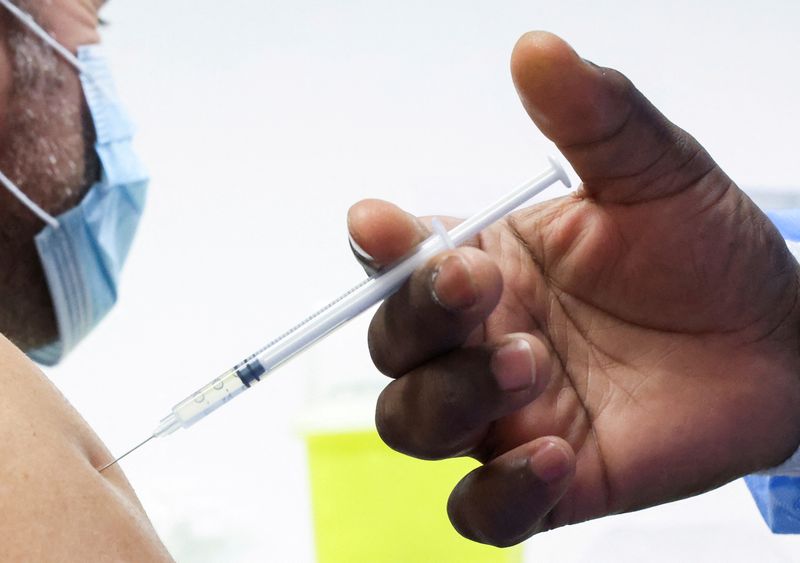By Nancy Lapid
(Reuters) - The following is a summary of some recent studies on COVID-19. They include research that warrants further study to corroborate the findings and that has yet to be certified by peer review.
Vaccine-related blood clots tied to gene, antibody variants
New research may help shed light on a rare but serious blood-clotting problem associated with the COVID-19 vaccines from AstraZeneca (NASDAQ:AZN) and Johnson & Johnson (NYSE:JNJ).
Five unrelated people with this clotting complication, known as vaccine-induced thrombotic thrombocytopenia, all had unusually-structured antibodies against a protein called PF4 that is involved in blood clotting, the researchers found. Furthermore, all five had a specific version of a gene responsible for producing these antibodies, they reported on Monday on medRxiv https://www.medrxiv.org/content/10.1101/2022.03.28.22272975v1 ahead of peer review. "The combination of a variant in a gene and the evolution of this antibody towards targeting in a highly deleterious manner the PF4 protein... leads to this disastrous complication," the researchers said. The prevalence of this gene varies and is highest in people of European descent, according to the report.
The finding "paves the way for a potential genetic screening tool to identify patients carrying this gene variant who are at risk of this severe complication" after receipt of these vaccines, said Tom Gordon and Jing Jing Wang of Flinders University of South Australia, two of the study's authors. "Additionally, this provides a unique opportunity for targeted, specific therapy development aimed at neutralizing this highly damaging but very specific antibody."
Concentrated antibodies may help immunosuppressed patients
Hospitalized COVID-19 patients who are severely immunocompromised may benefit from treatment with a purified, highly-concentrated form of antibody-rich blood plasma from previously infected people known as hyperimmune globulin, according to a small trial.
Netherlands-based researchers measured the need for mechanical ventilation, high-flow nasal oxygen, readmission for COVID-19 after hospital discharge or lack of clinical improvement among 18 subjects four weeks after administration of either SARS-CoV-2 hyperimmune globulin or immune globulin that did not contain antibodies to the coronavirus. These adverse outcomes occurred in 20% of patients who received the hyperimmune globulin with COVID-19 antibodies, compared to 88% of those who did not, according to a report posted on Tuesday on medRxiv https://www.medrxiv.org/content/10.1101/2022.04.04.22273314v1 ahead of peer review. The trial participants were organ transplant patients taking strong immunosuppressive drugs and others with diseases or medication regimens that impaired the function of immune cells called B cells.
In severely immunocompromised patients, SARS-CoV-2 hyperimmune globulin "may reduce the risk for severe COVID-19 and can be used when no monoclonal antibody therapies are available," the researchers concluded.
Glasses wearers may have lower COVID-19 risk
People who regularly wear glasses have a moderately lower risk of contracting COVID-19 while contact lenses offered no added protection, according to a large study that highlights the importance of the eye as a route of coronavirus infection.
More than 19,000 participants in the Virus Watch study in England and Wales responded to a questionnaire on the use of glasses and contact lenses. Starting as early as June 2020, participants had been reporting weekly on their COVID-19 status, and more than 11,000 provided monthly blood samples to show whether or not they had been infected with the coronavirus. After taking other risk factors into account, the researchers found a 15% lower risk of infection for those who reported wearing glasses always for general use compared to those who never wore glasses. The protective effect was reduced in those who said their glasses interfered with mask wearing, and there was no protective effect seen for contact lens wearers, according to a report posted on Monday on medRxiv https://www.medrxiv.org/content/10.1101/2022.03.29.22272997v1 ahead of peer review.
"Protective eye wear should be considered as part of broader strategies to prevent community transmission of infection and may be valuable to consider in the event of future pandemics and in high exposure occupations including healthcare," the researchers said.
Click for a Reuters graphic https://tmsnrt.rs/3c7R3Bl on vaccines in development.
